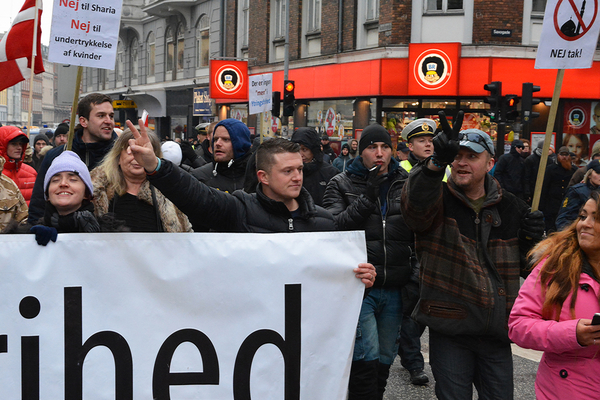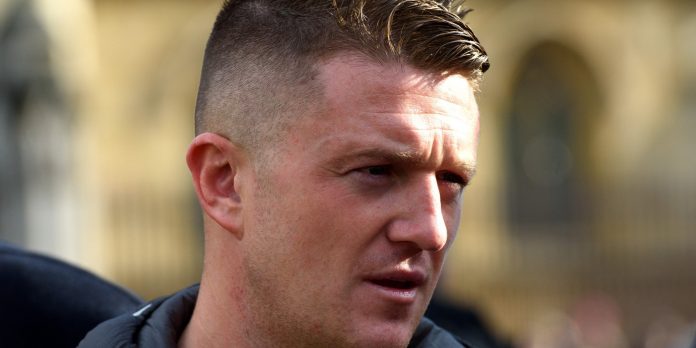He is a far right, Islamophobic extremist with an extensive history of violence and criminality.
Since the arrest and imprisonment of Stephen Yaxley-Lennon (AKA Tommy Robinson) for contempt of court, a series of “#FreeTommy” events have taken place across the UK and around the world. Based on the incorrect and conspiratorial notion that he has been wrongly imprisoned, merely for reporting on a rape trial, pro-Tommy actions have taken place in America, Australia and across Europe in addition to large outpourings of support on social media.
The truth is that Lennon was already under a suspended sentence for contempt of court violations in Canterbury last year and is now rightly starting a 13-month prison term, after naming defendants in a case, the charges and details of the allegations they faced, as well as filming defendants and confronting them outside court. The court heard it could cost taxpayers “hundreds and hundreds of thousands of pounds” if a re-trial had to be held.
Despite this, the Dutch tabloid Telegraaf thought it acceptable to describe Lennon as a “martyr of the working class” while other mainstream publications have ignored or played down his extremism. Stephen Lennon, is a far right, Islamophobic extremist with an extensive history of violence and criminality.
VIOLENCE AND CRIME RECORD
|
FAR RIGHT
To avoid straw-men arguments, we want to be clear. We don’t consider Lennon a “nazi”, a “fascist” or a “white supremacist”. Mis-/over-use of such terms risks devaluating them beyond usefulness and more importantly, miscategorisation reveals a lack of understanding which inevitably prohibits effective opposition.
The use of the term ‘far right’ has come under increasing attack by those on the Right of the political spectrum.
As well as people such as Lennon rejecting the tag when applied to themselves, right-wing commentators such as Douglas Murray have recently argued that “overuse of the term has eroded the boundaries it created, making many people suspicious of all such designations,”. He bemoans “name creep” and asks: “Is nobody interested in the differences?”
While Murray’s motives for questioning the term are transparent (his gripe about the broadness of its use is not entirely unfair), his argument that there “was a time when the term acted as a useful cordon sanitaire” between the fascists and nazis and the rest of the Right is inaccurate. The term has long been a broad umbrella that encompasses people and movements ranging from the democratic, populist, radical right through to the extreme authoritarian far right.
This begs the question of whether Murray’s inaccurate lament of “name creep” and Lennon’s anger at being labelled with the term derives from them not understanding it.
When Lennon stormed the offices of a newspaper in Wales he said:
However, it is worth stating from the outset that Lennon’s refusal to self-identify as far right is irrelevant. As Jean-Yves Camus and Nicolas Lebourg point out in Far-Right Politics in Europe: “The label ‘far right’ is practically never used by those who belong to it”.
But how do we define the term, and why do we class Lennon as ‘far right’?
Camus and Lebourg provide a useful taxonomic classification within which Stephen Lennon fits comfortably:
“Far-Right movements challenge the political system in place, both its institutions and its values (political liberalism and egalitarian humanism).
They feel that society is in a state of decay, which is exacerbated by the state: accordingly, they take on what they perceive to be a redemptive mission.
They constitute a countersociety and portray themselves as an alternative elite.
Their internal operations rest not on democratic rules but on the emergence of “true elites.” In their imaginary, they link history and society to archetypal figures […] and glorify irrational, nonmaterialistic values […]. And finally, they reject the geopolitical order as it exists.”
Both as leader of the EDL and now as a Rebel Mediacontributor, Lennon and his associates warn of a decaying Britain in crisis, heading for destruction, betrayed by existing political elites and institutions.
He attacks the liberal, progressive societal consensus and those on a supposedly homogenous “left” who advance it. He articulates conspiracy theories about the mainstream media, vaults bastardised images of historical figures and roots his politics in a mythical history; his sleeve of patriotic tattoos includes a crusader knight, a poppy, the Magna Carta and a quote from Winston Churchill.
ISLAMOPHOBIC
In a phrase oft-repeated by anti-Muslim activists (so-called ‘counter-jihadists’) and staunch secularists, Christopher Hitchens described (though he may have been quoting Andrew Cummins) Islamophobia as “a word created by fascists, and used by cowards, to manipulate morons.” Though a man of undeniable talents, Hitchens on this occasion was well wide of the mark. While it has a contested etymology, the term gained popular usage following the landmark 1997 report Islamophobia: a challenge for us all by the Runnymede Trust.
As is so often the case there remains no consensual definition for the term. (Though, it sometimes feels as though “Islamophobia” is held to a higher definitional standard, with those who decry its use – usually claiming it is not a “–phobia” – rarely raising similar concerns over the use of terms such as “homophobia”.)
In 2005, the Council of Europe offered the following definition for Islamophobia:
It is worth adding a section of the 2016 definition offered by the Foundation for Political, Economic and Social Research (SETA): “Islamophobia operates by constructing a static ‘Muslim’ identity, which is attributed in negative terms and generalized for all Muslims.”
Brief period of contrived penitence aside, Lennon’s views on Islam and Muslims, from his time as founder and leader of the EDL through to today, have been consistently Islamophobic.
Despite platitudes to the contrary, Lennon routinely fails to draw a distinction between Islamist extremists and ordinary Muslims. To see Lennon’s prejudiced homogenisation of all Muslims in sharp focus, one need look no further than his reaction to the arrival in Europe of refugees and migrants fleeing Islamic extremism in the Middle East. He has completely refused to draw a distinction between perpetrator and victim.
“I’d personally send every adult male Muslim that has come into the EU over the past 12 months back tomorrow if I could. Fake refugees,” he tweeted in early 2016.

HOPE not hate has long opposed Islamist extremism in the UK and while in Iraq making our mini-film Life on the run from the Islamic State, we saw the unconscionable human suffering that the victims of IS have experienced. Only a person like Lennon, blinded by anti-Muslim prejudice, could refuse to make a distinction between those Muslims seeking refuge in Europe from those committing the atrocities.
However, his Islamophobia is best understood as part of what is known as ‘counter-jihad’ ideology. Counter-Jihadism is a broad alliance of organisations and individuals that believe that Western civilisation is under attack from Islam. Despite varying degrees of extremity, all generally agree that Islam is a supremacist religion and many, like Lennon, see little difference between extremists and ordinary Muslims who live their lives quite peacefully.
While regularly professing to only being opposed to Islamist extremism or, more latterly, positing that he is against Islam not Muslims per se – “I’m not talking about Muslims, I’m talking about Islam”– the reality of his rhetoric is quite different.

While Britain’s Muslim community is best understood as a ‘community of communities’, Lennon regularly irons out all cultural, religious, national and socio-economic nuance and portrays Muslims and Islam as a single monolithic block.
This block is usually characterised by its most extreme and unsavoury elements: “Islam is fascist and it’s violent and we’ve had enough!” according to Lennon.
In addition to extrapolating out the actions of a minority, he also demands collective responsibility for those actions.
In east London in 2011 he seemed to suggest he and the English Defence League would retaliate indiscriminately should there be another terrorist attack:
While there is absolutely nothing wrong with opposing Islamism or even criticising Islam itself, most counter-jihadists believe that secular, liberal society and a supposedly complicit “mainstream media” are aiding Islam through mass immigration into Europe and policies of multiculturalism, which they believe squash any criticism of the religion.
In a 2017 interview about the expansion of Rebel Media into the UK, Lennon argued: “The media steer clear of anything that gives a negative portrayal of Islam” and talked of the “liberal elite agenda”.
His claims are of course spurious with evidence suggesting that, quite to the contrary, the British media’s portrayal of Muslims “has been largely negative and stereotypical informed often by a virulent, racialised Islamophobic discourse”. In fact, surveys have shown that British Muslims typically identify as at least, if not more, loyal to Britain than other communities.
Central to Lennon’s Islamophobia, and that of his counter-jihad allies, is the notion that a mythical, usually Christian, western culture and identity is said to be facing extinction at the hands of Islamic invasion. Broadly speaking they believe there is a clash of civilisations between Islam and the West. While ideas around the nature, inevitability and desirability of this clash vary greatly among activists, many see some sort of conflict as inevitable.
As Lennon said in a recent Facebook Live video: “In the next five years it’s all going to come to a head.”
EXTREMIST
After the recent fallout from Lennon’s #TrollWatch video where he stormed the offices of the Quilliam Foundation, he appeared on the BBC Daily Politics show and said: “I’ve never been an extremist, ever.”
Many will have understandably dismissed this comment as laughable but to appease Lennon’s seemingly insatiable desire to have the obvious “justified”, we will indulge him.
Once again, the definitional debate about what constitutes “extremism” is complex but several dictionary definitions offer a useful starting point. The Cambridge Dictionary categorises an extremist as “someone who has beliefs that most people think are unreasonable and unacceptable”. Lennon’s views as explained above clearly fit this definition.
The Collins dictionary describes an extremist as: “a person who favours or resorts to immoderate, uncompromising, or fanatical methods or behaviour, esp[cially] in being politically radical”.
The fact that this very article has been prompted by Lennon’s campaign of intimidation against political opponents – storming their offices and visiting their houses at night – is clear evidence of him using extremist behaviour to advance his political cause. However, when coupled with his own violent record and that of the organisation he ran, it becomes very hard for him to reject the tag of extremism.

At its height, the Lennon-led EDL ventured from town-to-town across the UK, leaving a trail of destruction and division in its wake. In 2013, it was revealed that policing costs for its demonstrations had risen to over £10m during four years, with violence being commonplace.
Lennon himself has a record of extreme violence and criminality, including:
- being arrested for playing an integral part in a 100-man brawl while chanting “EDL till I die”
- breaching his bail conditions by attending an EDL demonstration in Tower Hamlets
- being convicted of common assault for head-butting a fellow EDL member in 2011
- being arrested and imprisoned for entering the U.S. illegally in 2012.
Upon leaving the EDL Lennon even accepted and apologised that his actions over the years had frightened the UK Islamic community. However, the disingenuous nature of his apologies has been put in stark relief since then.
Stephen Lennon founded and ran an anti-Muslim street protest movement that brought violence to the streets of the UK. He has regularly engaged in violence. He intimidates his political opponents by storming their offices and confronting them at their homes.
In our eyes, this makes him an extremist.
Stephen Lennon is a far-right, Islamophobic extremist and now you know exactly why.







